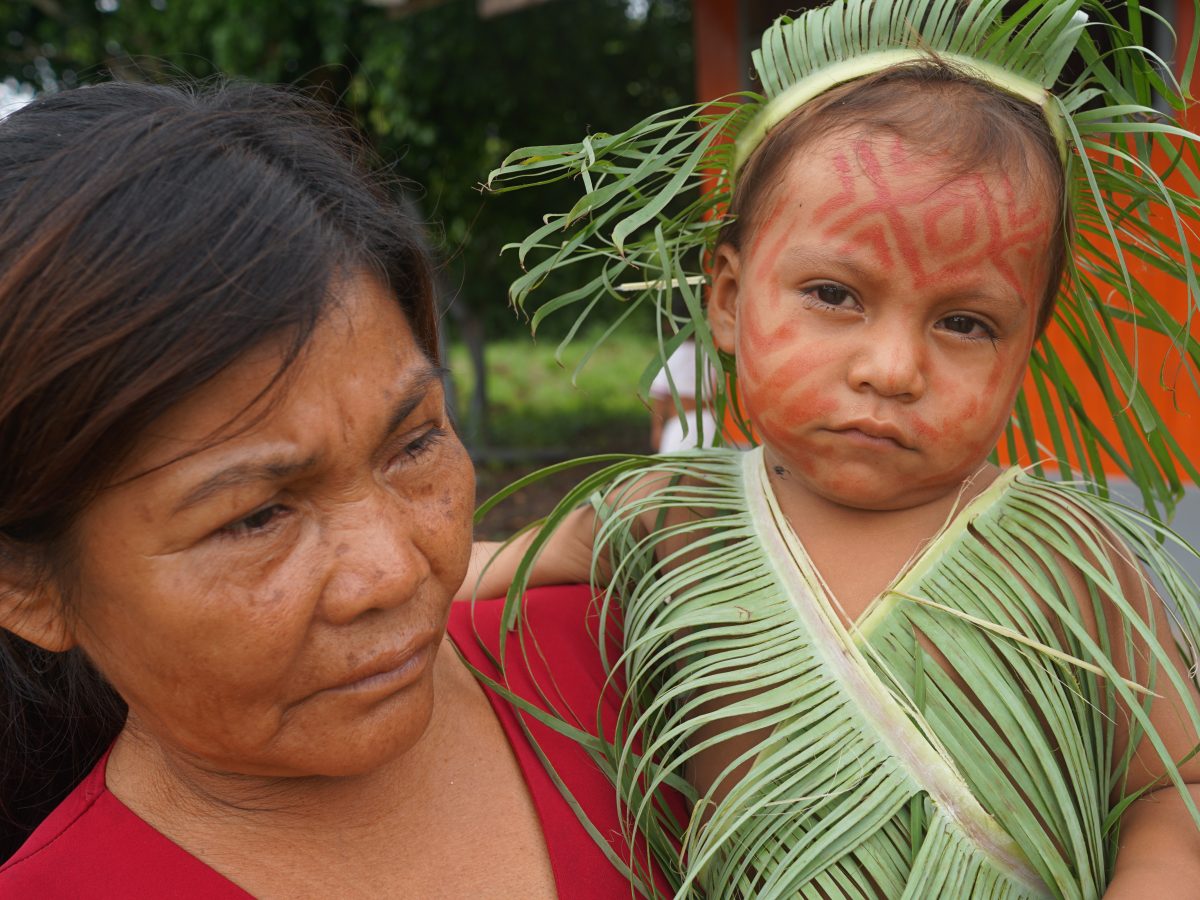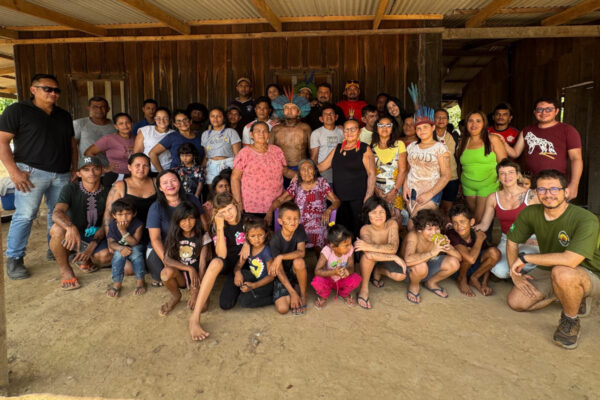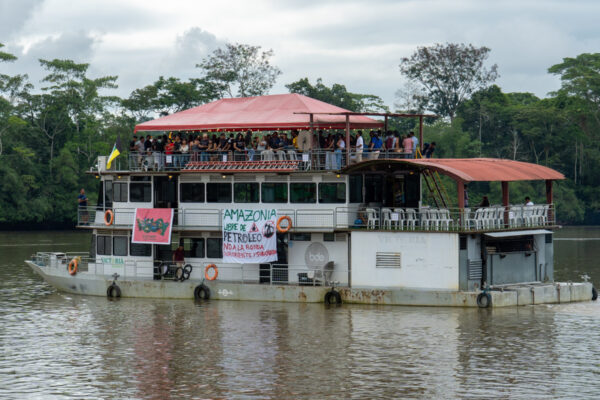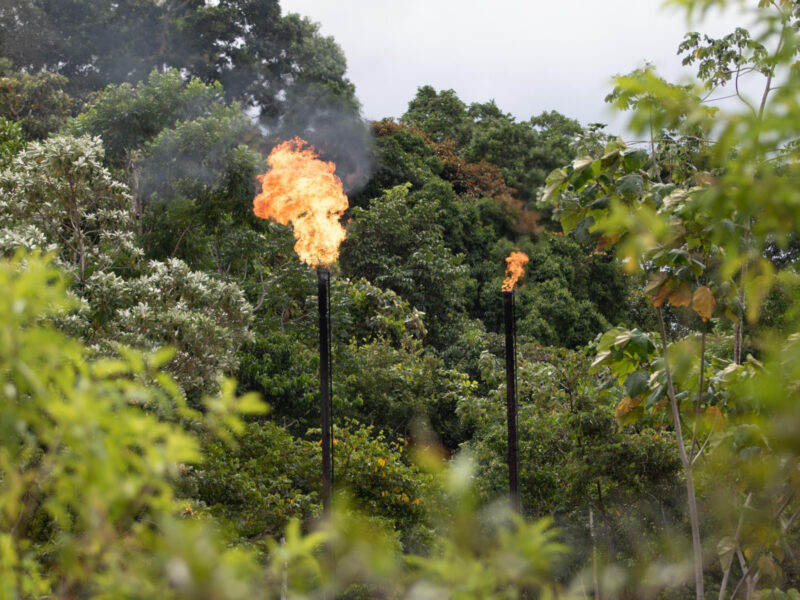With a vaccination rate that is already surpassing 120,000 patients per day, Peru is finally showing glimmers of hope that it will overcome the worst of the pandemic. However, a glance towards the Peruvian Amazon shows a different reality. Recovery from COVID-19 in this biodiverse region will be difficult and Indigenous communities will need international support.
As we’ve previously reported, government institutions abandoned the Amazon region to focus on containing the pandemic in the cities. Indigenous peoples responded with the same strategy that has worked for them through more than 500 years of pandemics: go deep into the jungle to their tambos, the houses they use on hunting and fishing expeditions.
Unfortunately, since they’ve left, illegal loggers have deforested large areas of protected primary forests in the vacant Indigenous communities.
Criminal activities also flourished, with drug trafficking increasing and for the first time, becoming the main driver of deforestation in the Ucayali region. Before the pandemic, most of the region’s deforestation was caused by the arrival of low-income farmers from the Andes in search of new lands to grow papaya, rice, cocoa, or coffee.
According to data from the Instituto del Bien Común, the increase in conflicts and violence related to drug trafficking and illegal logging has led to the murders of 12 Indigenous leaders in the Peruvian Amazon. The victims belong to different Indigenous peoples, but the Kakataibo people have definitely been hit the worst, with four leaders assassinated and many facing ongoing death threats.
Overall, this has been a tough year for the Peruvian Indigenous movement and we’ve responded by stepping up and accompanying our partners in their campaigns. In supporting their advocacy campaign, we secured a meeting between the Regional Organization of AIDESEP in Ucayali (ORAU) and government officials including ministers, vice-ministers, prosecutors, police, and military authorities to address the threats and violence. An agreement was reached to immediately implement emergency measures by the Inter-Agency Task Force for the Protection of Human Rights Defenders, the joint ad-hoc group responsible for protecting people facing serious and credible threats, such as Herlin and Zulema, and many others who must remain anonymous.
The task force will have the responsibility of issuing alerts and coordinating immediate actions in response to risks faced by Indigenous leaders. In addition, the Ministry of Justice made the promising decision to hire Indigenous lawyer Susy Díaz, a Shipibo woman who has the trust of local organizations. Díaz will be responsible for ensuring the proactive participation of Indigenous leaders as well as active efforts by the representatives of the executive branch and the prosecutor’s office.
In a conversation with Servindi, Díaz explained that they have been coordinating with government authorities and Indigenous leaders to prioritize the actions that the joint task force will implement. “We are working to define the protocol that will be followed when an alert is triggered so that we can be ready to work together,” said the lawyer.
This is certainly good news and a significant achievement for the communities who have relentlessly organized for it. An example of the scale and diversity of strategies deployed was the successful Indigenous diplomacy by ORAU. They pressured the US State Department to communicate personally with the Peruvian Prime Minister, and it directly led to him finally issuing the decree that created the joint task force.
While this doesn’t address the root of the problem, at least now we have a process that we can use to begin to protect Indigenous Earth defenders from threats. To do this, the task force and Indigenous organizations will need to overcome several challenges in order to bring peace and stop deforestation in the Peruvian Amazon. They must:
- Encourage international donors to support the operations of the task force – which to date does not have its own budget line – and to provide the necessary technical and financial support.
- Attack the root causes of violence: Accelerate the process of restitution of Indigenous lands invaded by drug trafficking back to Indigenous communities and reorient the entire alternative economic development strategy based on a sustained dialogue with Indigenous organizations.
- The Peruvian Prosecutor’s Office and the Judiciary System must also step in and implement legal strategies to guarantee justice for Indigenous Earth defenders and tackle impunity. Years have passed since this violent crisis started, yet there has been no accountability or charges filed.
- Provide reparations to the families of defenders who have been murdered, with special consideration of gender in cases like Zulema Guevara’s, who lost her husband and had to flee her community. Zulema and her family have been forcibly displaced. Now she is not only a defender under threat for demanding justice in her husband’s case but also a single mother with no job or family connections in the city where she is now a refugee and lives in fear of retaliation.
With the new Peruvian president’s inauguration just around the corner, we must all remain alert and pressure the incoming government to prioritize the crisis of violence against Indigenous defenders and builds upon what has been recently accomplished. Indigenous organizations, and especially the Cacataibo People, will need our voices and solidarity in order to maintain the small steps of victory that have already been achieved.
Finally, we must not forget that Indigenous organizations in the area have already made the decision to defend their communities from narco-networks. We must remain vigilant so that no more lives are lost and so that the central Peruvian Amazon can be recovered and given back to its rightful owners: The Indigenous peoples that have defended and protected the region for millennia.
The new governments of Peru and the United States are already indebted to Indigenous peoples for their contributions to the protection of the rainforest and our climate. They must repay this debt by contributing to the protection and preservation of their territories. The destruction by narco-trafficking is only contained by Indigenous peoples whose communities serve as barriers to deforestation. Their outsized role in nature and the future of our Earth requires action from each of us. As members of civil society in solidarity with Indigenous movements, it is our responsibility to continue standing by their side in this crucial moment and amplifying every demand until they are met.














